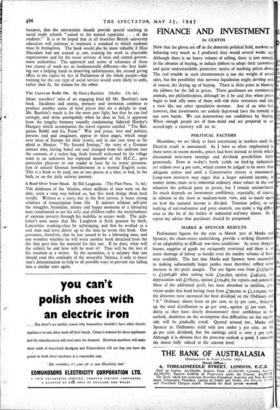FINANCE AND INVESTMENT
Now that the gloves are off in the domestic political-field, markets are behaving very much as I predicted they would several weeks ago. Although there is no heavy volume of selling, there is just enough, in the absence of buying, to induce jobbers to adopt their customary and quite understandable protective tactics of marking prices down. The real trouble in such circumstances is not the weight of actual sales, but the possibility that nervous liquidation might develop and, of 'course, the drying up of buying. There is little point in blaming the jobbers for the fall in prices. These gentlemen are commercial animals, not philanthropists, although let it be said that when prices begin to look silly some of them will risk their resources and take a view like any other speculative investor. Any of us who feel, however, that investments are unduly depressed have the remedy in our own hands. We can demonstrate our confidence by buying. When enough people are of that. mind and are prepared to act accordingly a recovery will set in.
POLITICAL FACTORS
Meantime, we are likely to have uncertainty in markets until the Election result is announced. As I have so often emphasised in these notes in recent months, prices had been hoisted to levels which discounted near-term earnings and dividend possibilities fairly generously. Even at to-day's levels yields on leading industrials are seldom over 4 per cent., which cannot be judged to be more than adequate unless and until a Conservative victory is announced. Long-view investors may argue that a larger national income, in money terms, must raise industrial ordinary share values in the whatever the political party in power, but I remain unconvinced. So much depends on investment confidenCe, especially,. of course, in relation to the short or medium-term view, and so 'much again on how the national income is divided. Taxation policy, to sav nothing of nationalisation and price controls, can make a big differ ence to the lot of the holder of industrial ordinary shares. So I repeat my advice that purchases should be postponed. •
. . MARKS & SPENCER RESULTS
Preliminary figures- for the year to March. 31st of Marks and Spencer, the chain-stores undertaking, provide-a striking illustration of an adaptability to difficult war-tune Conditions.. As" every shopper knows, supplies of goods are stringently restricted and there is as acute shortage of labour to handle even the smaller volume .of ness available. The fact that Marks and Spencer have succeeded in making substantially larger profits must therefore reflect some increase in the profit margin. The net figure rosefrom £1,574,029 to £1,916,487 after setting aside £241;650, against £246,521, for depreciation and £178,032, against £119,461, for repairs and renewals. Most of the additional profit has been absorbed in taxation, pro- vision under this head having risen from £79o,00o to kx,110,000, but the directors have increased the final dividend on the Ordinary and " A " Ordinary shares from 20 per cent. to 25 per cent., bring up the total distribution to 4o per cent., against 35 per cent. In doing so they have clearly demonstrated their confidence in the outlook, doubtless on the assumption' that, difficulties on the.supply side will be gradually cased. Quoted- around 7os., Marks and Spencer 5s. Ordinaries yield only just under 3 per cent. on the 4o per cent. dividend, but the earnings yied is_ over 5 per cent. Although it is obvious that the post-war outlook is good, I consider the shares fully valued at the current level. -


























 Previous page
Previous page